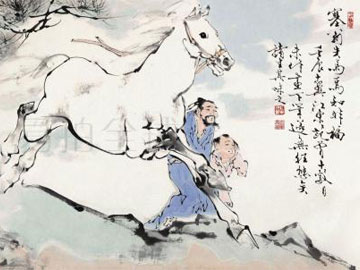Chengyu Tuesdays: The Old Man Loses His Horse
塞翁失马 sàiwēngshīmǎ – A blessing in disguise

We've done myths and Cantonese. Now this month we're running a series of interesting 成语 (chéngyǔ), the four-character Chinese idioms that often have stories behind them. Whip them out in conversation to look crazy cultured.
塞翁失马 (sàiwēngshīmǎ) could literally be translated as “this old man lost this horse”. 塞 is a particle for “here”, which in this case refers to a border region. 翁 is “old man”, often also connoting wisdom. 失 is “lose”, 马 is “horse”. It’s often followed by 焉知非福 (yānzhīfēifú) – “how is one to know if it’s misfortune or fortune?” Here’s the story behind it, from Chinese-Chengyu.com:
There once was an old man who lived with his only son at the border of the state. They liked horses and often let them graze freely. One time a servant reported to the old man, “A horse is missing! It went into the neighboring state.”
His friends felt sorry for him, but the old man was not bothered at all by the loss. In fact, he said: “Who knows! The loss may bring us good fortune!”
A few months later, a weird thing happened. Not only did the missing horse return home safely, it also brought back with it a fine horse from the neighboring state.
When his friends heard the news, they congratulated the old man on his good luck. But the old man said, “Who knows! This may bring us ill fortune!”
One day, when the old man’s son was riding the fine horse, he fell off it, broke his leg very badly and became crippled. Many friends came to comfort the old man, but the old man was not disturbed by the accident in the least. “Who knows! This may bring us good fortune after all!” he said.
A year later, the neighboring state sent troops across the border. All young and strong men were drafted to join the fight, and most of them got killed. The old man’s son however was not drafted because he was crippled - and so his life was spared.
















